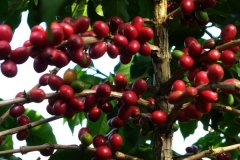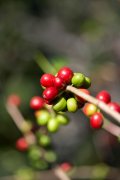Introduction to Mexico Coffee, the fourth largest coffee producer in the world.
Foreign markets are more closely linked, and the NAFTA agreement between Canada, the United States and Mexico will further help Mexican products export to North America. Some people think that the best giant coffee beans are made in Mexico rather than Guatemala, but the supply and quality of coffee beans in both places can vary. The coffee beans, known as Maragogype, are large-grained and produce coffee that is smooth, mellow and fragrant. The poverty of farmers has caused most coffee to grow under natural conditions, that is, without the use of chemicals such as insecticides or fertilizers. The best coffee producer in Mexico is Chiapas in the south of the country, where coffee varieties including Tapanchula and Huixtla are grown. The Oaxaca region also produces high-quality coffee beans, Pluma, which grows in natural conditions.
Coixtepec) Coffee beans are one of the best. The Oaxaca region also produces Altura Orisaba (Altura Orizaba) coffee and Altura Vatusco (Altura)
Huatusco) coffee. Altura Atta Paike (Altura
Coatapec) region produces Veracruz coffee. The best giant coffee bean in Mexico is Liquidambar.
MS) coffee beans. Coffee from the world's fourth largest coffee producer, slippery and fragrant, Mexico, the fourth largest coffee producer in the world, produces about 5 million bags of coffee a year. Most of its coffee is produced by nearly 100000 small farmers, and large estates that once manipulated the coffee industry are rare. The yield of Mexican coffee is about 630 kg per hectare. Later, the Mexican Coffee Association (Instituto)
Mexicano del
Caf é, or Inmecafe for short, controls the coffee industry. The Coffee Association controls both coffee cultivation and the market for coffee beans that can be exported since November. The association provides farmers with minimum purchase prices, technical advice and other assistance. However, since 1991, the Coffee Association's activities have been reduced, and its functions are likely to be further weakened.

Important Notice :
前街咖啡 FrontStreet Coffee has moved to new addredd:
FrontStreet Coffee Address: 315,Donghua East Road,GuangZhou
Tel:020 38364473
- Prev

The famous producing area of Peruvian coffee is Chanchamayo, the mellow American coffee.
The global trend of modern coffee has gone through three popular stages: the first stage is the popularity of cheap coffee represented by instant coffee from the post-World War II to the 1960s; the second stage is the popularity of commercial coffee represented by Starbucks from the 1960s to the beginning of this century; the third stage is the popularity of boutique coffee, which originated in the 1970s and has become a trend in the past decade.
- Next

Mexican Coffee Mexico Coffee is a big producer of machine coffee in the Vivetenango region of Guatemala.
The global trend of modern coffee has gone through three popular stages: the first stage is the popularity of cheap coffee represented by instant coffee from the post-World War II to the 1960s; the second stage is the popularity of commercial coffee represented by Starbucks from the 1960s to the beginning of this century; the third stage is the popularity of boutique coffee, which originated in the 1970s and has become a trend in the past decade.
Related
- Does Rose Summer choose Blue, Green or Red? Detailed explanation of Rose Summer Coffee plots and Classification in Panamanian Jade Manor
- What is the difference between the origin, producing area, processing plant, cooperative and manor of coffee beans?
- How fine does the espresso powder fit? how to grind the espresso?
- Sca coffee roasting degree color card coffee roasting degree 8 roasting color values what do you mean?
- The practice of lattes: how to make lattes at home
- Introduction to Indonesian Fine Coffee beans-- Java Coffee producing area of Indonesian Arabica Coffee
- How much will the flavor of light and medium roasted rose summer be expressed? What baking level is rose summer suitable for?
- Introduction to the characteristics of washing, sun-drying or wet-planing coffee commonly used in Mantenin, Indonesia
- Price characteristics of Arabica Coffee Bean Starbucks introduction to Manning Coffee Bean Taste producing area Variety Manor
- What is the authentic Yega flavor? What are the flavor characteristics of the really excellent Yejasuffi coffee beans?

